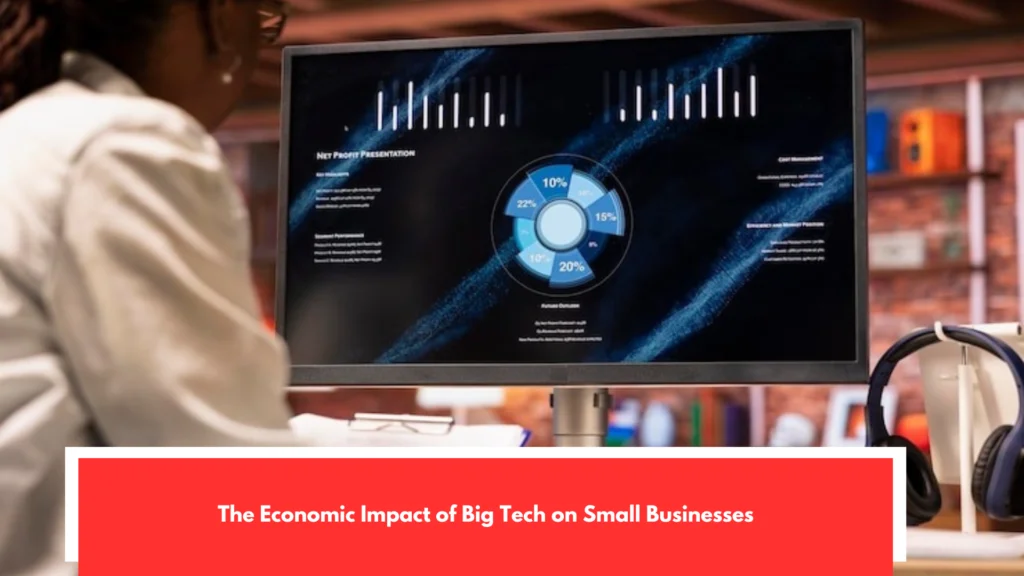For example, Mercado Libre allows small sellers and entrepreneurs to sell products locally and regionally, making transactions simple for those who want to sell without needing a physical store. Greater efficiency. Technologies facilitate the “atonality?” of productivity that makes the existence of increasingly smaller businesses feasible. The implementation of technologies such as artificial intelligence (AI), robotics, and big data allows companies to operate with fewer workers, and therefore less staff and less physical plant, but with greater productivity. This is how the economic impact of big tech on small businesses.
PedidosYa, as applied to other small businesses, such as local restaurants and retail stores, is able to optimally manage orders thanks to its platform, automating delivery processes and cutting operating costs. Automation of sophisticated coordination processes. Many large companies lamented in the past that they were unable to outsource, instead of being able to outsource, the complex, complex processes that were difficult to outsource. This was due to the enormous volume of data that process coordination required, and the speed required to carry it out.
How AI Is Changing the Small Business Landscape

Advances in software deployment enable this coordination today. An example of this highly complex coordination is that between Bosch and vehicle manufacturers such as Toyota and Volkswagen. Communication systems and planning software allow automotive companies to outsource typical parts of the production cycle to specialist suppliers such as Bosch in advanced design and manufacturing systems for components such as braking systems or sensors, and also efficiently process data and technical specifications between vehicles.
There is an urgent need to improve the planning environment for simpler companies. Collaborative platforms create efficient markets where suppliers and buyers meet efficiently (low transaction costs) and effectively (fair matches), thanks to the environment these platforms generate. Participating companies—or the platforms themselves, thanks to their design—can easily unlock the benefits these platforms offer, because they take on the burden of labels that companies had carried for years.
Trends In Acquisitions

Uber offers the possibility for individuals to become drivers and avoid the details of a new fleet and organizational complexity. And Airbnb helps individuals rent spaces without having to break into haute cuisine and hospitality, or address the problems of museums or the needs of chains. The same thing happens when technological changes increase the mass of certain sectors. Let’s learn about the forces at work in this way. Overcoming the Price Incompatibility Personalization.
Until now, designing products and services tailored to the needs of small segments has been of interest and led to the survival of small businesses. When this situation arose, we had to rely on large companies, based on the benefits of scale, to sell a standard product at a low price. New value in the personalized market resulted in a more expensive product, but the benefit was that it responded to the specific needs of particular customers.
Platform Reliability

It is a fixed cost. The knowledge acquired for the creation of an easy-to-use product can be used for the product with infinite production, without additional variable production costs. This is a major incentive to invest large research and development budgets. If these budgets work, they are a barrier to entry into the formidable category of the sector. Google, the major R&D investor, spends millions developing the most sophisticated algorithms and then applies them to its entire library, including searches, map navigation, and translations.
Conclusion

We have seen the emergence over the last 30 years of mega-companies based in ICT information and communication technologies such as Amazon, Apple, Facebook, Google, Mercado Libre and Microsoft. These same micro-enterprises are also flourishing, including millions of personal service and manufacturing companies. So, what is going on with the development of Evidence for successfully implementing a competition policy. I’ve spent my entire life collecting the tragedies of competition law violations. O
ne might think it’s senatorially drafted for consumer protection, but it generally ends up protecting small businesses from the abuses suffered by larger companies. The issue has been worsened by sectors that rely on the dollar from the past and by large companies, like a powerful obelisk. This is the case of Meta, Facebook in its time, which has had its fair share of monopoly cases due to its purchase of Instagram and WhatsApp, a fact that makes it difficult to implement competition. Unlocking restrictions of the “physical” world.
